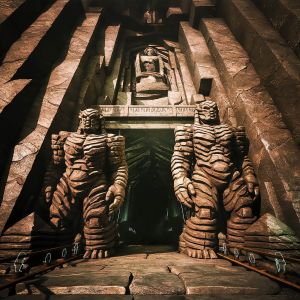Darak-Kel: Difference between revisions
No edit summary |
m Text replacement - "Kel-Vorun" to "Ka-Vorun" |
||
| (10 intermediate revisions by the same user not shown) | |||
| Line 1: | Line 1: | ||
{{ | {{Districts of Kar-Thal Infobox | ||
|Name=Darak-Kel | |Name=Darak-Kel | ||
|Image=[[File:Kar-Thal - Darak Kel 01.jpg|center|frameless]] | |Image=[[File:Kar-Thal - Darak Kel 01.jpg|center|frameless]] | ||
|City=[[Kar-Thal]] | |City=[[Kar-Thal]] | ||
|Function=Governance and Ritual | |Function=Governance and Ritual | ||
|Notable Locations=Hall of | |Notable Locations=Grand Hall of Oras, Ka-Vorun, Tharakul | ||
}} | }} | ||
{{ | {{Districts of Kar-Thal Sections | ||
|Introduction=Darak-Kel | |Introduction=Darak-Kel is the political and ceremonial heart of Kar-Thal. Anchored around the sacred Great Hall of [[Oras]], it serves as the core site of governance, oath-taking, and ancestral continuity. | ||
|Function=The district functions as the locus of civic decision-making, ritual pronouncement, and | |Function=The district functions as the locus of civic decision-making, ritual pronouncement, and stewardship. Within its halls, the [[Council of Kar-Thal]] deliberates beneath ancestral effigies. | ||
|History=Founded at the inception of Kar-Thal | |History=Founded at the inception of Kar-Thal, Darak-Kel has remained unchanged in form and function for centuries. The district has been where every major oath, law, and proclamation has been made since the city's founding. | ||
|Notable Locations=* [[ | |Notable Locations=* [[Grand Hall of Oras]]: The central chamber where the Council of Kar-Thal convenes. Its basalt columns are tuned to amplify spoken words, allowing declarations to reverberate across the chamber. | ||
* [[ | * [[Ka-Vorun]]: A secluded chamber used for the sealing of ancestral pacts and oaths. Designed to capture and repeat vows whispered into its walls. | ||
* [[ | * [[Tharakul]]: A series of terraced platforms carved into the bedrock, used for public pronouncements and ritual ascents during times of civic renewal. | ||
|Cultural Practices=Access to Darak-Kel is tightly controlled. While the inner sanctum is restricted to officials | |Cultural Practices=Access to Darak-Kel is tightly controlled. While the inner sanctum is restricted to officials, citizens may gather in outer halls to listen to announcements of council proceedings. | ||
|Bibliography=* {{BibliographyEntry|Category=history|Title=Stone as Witness: The Ritual Architecture of Kar-Thal}} by [[Lorewarden]] Evasul | |||
* {{BibliographyEntry|Category=history|Title=Chronicle of the Echo Seat}} ([[Ashlar Vaults]], Record Layer II) | |||
* {{BibliographyEntry|Category=history|Title=Resonance and Rule: The Rituals of Darak-Kel}} by Lorewarden Vem Taarak | |||
{{BibliographyEntry|Category=history|Title=Resonance and Rule: The Rituals of Darak-Kel}} by Lorewarden Vem Taarak | |||
}} | }} | ||
Latest revision as of 19:40, 15 January 2026
| Darak-Kel | |
|---|---|
| Image |  |
| City | Kar-Thal |
| Function | Governance and Ritual |
| Notable Locations | Grand Hall of Oras • Ka-Vorun • Tharakul |
Introduction
Darak-Kel is the political and ceremonial heart of Kar-Thal. Anchored around the sacred Great Hall of Oras, it serves as the core site of governance, oath-taking, and ancestral continuity.
Function
The district functions as the locus of civic decision-making, ritual pronouncement, and stewardship. Within its halls, the Council of Kar-Thal deliberates beneath ancestral effigies.
History
Founded at the inception of Kar-Thal, Darak-Kel has remained unchanged in form and function for centuries. The district has been where every major oath, law, and proclamation has been made since the city's founding.
Notable Locations
- Grand Hall of Oras: The central chamber where the Council of Kar-Thal convenes. Its basalt columns are tuned to amplify spoken words, allowing declarations to reverberate across the chamber.
- Ka-Vorun: A secluded chamber used for the sealing of ancestral pacts and oaths. Designed to capture and repeat vows whispered into its walls.
- Tharakul: A series of terraced platforms carved into the bedrock, used for public pronouncements and ritual ascents during times of civic renewal.
Cultural Practices
Access to Darak-Kel is tightly controlled. While the inner sanctum is restricted to officials, citizens may gather in outer halls to listen to announcements of council proceedings.
Bibliography
- Stone as Witness: The Ritual Architecture of Kar-Thal by Lorewarden Evasul
- Chronicle of the Echo Seat (Ashlar Vaults, Record Layer II)
- Resonance and Rule: The Rituals of Darak-Kel by Lorewarden Vem Taarak